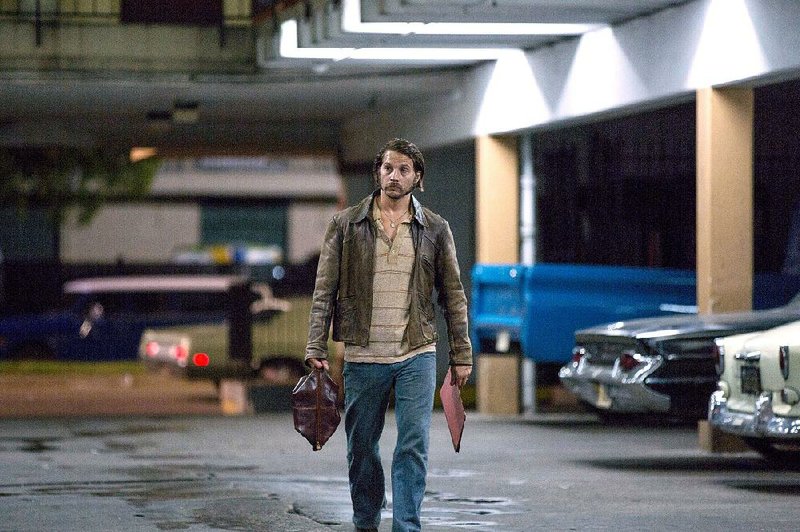Little Rock writer Graham Gordy's Quarry, a '70s Memphis-set crime drama he conceived with Michael D. Fuller based on the novels by Max Allan Collins, premiered on Cinemax on Sept. 9 to mostly admiring reviews. The Washington Post's Hank Stuever proclaimed it the best new show of the season and compared it to "another very good show that took forever to catch on ... about a cancer-stricken chemistry teacher in Albuquerque who started cooking meth to make money."
As of this writing I've seen two (of eight) episodes. I like the way it both nods to genre conventions and insists on being unsentimental about the repercussions of violence. It maps new physical and psychological territory as it drills down into the mind of a reluctant hit man, a traumatized Vietnam vet with exquisite musical taste.
I know Gordy and have followed his career with an interest that can't be fairly described as detached. In this spirit, I talked to him about the show.
(A less-edited version of the interview is posted on the blood, dirt & angels blog.)
Q. Quarry doesn't feel like it's been focus-grouped. I'm wondering if the delivery method has any significant effect on the product. Would this be a different show had it aired somewhere else?
A. There are a lot of freedoms given you at Cinemax in terms of content. At networks like AMC or FX or the like, you're literally counting your cuss words (and we're pretty profane). We have no interest in being gratuitous, but it's a show about ... the damage violence does, not only to the people to whom it is done but also the psychological damage done to the people doing it. We need some leeway for that.
HBO owns Cinemax. We initially sold the show to HBO ... [who] offered us a choice: Go into development at HBO or shoot a pilot at Cinemax. Based on a new mandate by Cinemax for more character-based original content (which eventually led to them putting on The Knick and some of the other projects they are moving toward now), we chose the bird-in-the-hand.
HBO is the pinnacle of cable programming, but they put very little on the air, and there are people who have shelves full of Oscars and Emmys who have had projects in "development" there for years ... So there are benefits and drawbacks to Cinemax. There's content, of course, but there's also less pressure.
Q. Collaborative writing seems like an odd thing, but it's obviously how things are done -- and how things must be done -- in the world you're inhabiting. There's bound to be creative frictions, and so there has to be a mechanism for conflict resolution, right? Someone has to be the shot caller.
A. Well, there's the collaboration between Michael Fuller and I, and then there's the collaboration with Max Allan Collins, the other writers in the writers' room, the network, the director and then our actors.
Michael and I have worked together before. We had written two pilots together -- were part of the Rectify writers' room together. We wouldn't still be writing together if we didn't generally agree on more than 90 percent of all decisions. Thankfully, we have a lot in common and just generally have a shared creative vision. Of the 10 percent of things we disagree about, about 8 percent of those are just miscommunication ... Of the 2 percent that's left over, we'll talk it out and one of us will give. It doesn't happen a lot, so if one of us is extremely passionate on the point, we'll usually defer to that person. I guess that if one of us feels that right about something, that person usually is.
With the other writers, it was easy because our writers' room was tiny and Jen Schuur (our other writer for Season 1) is one of the kindest, most supportive, collaborative, funny people you could have in that situation. ... Max, the author of the novels, wrote one of the episodes in Season 1, but wasn't in the room. We would talk to him frequently and update him on what we were laying out ... Max absolutely gave his opinions and input, but he was utterly game every step of the way.
One of the biggest differences, and the steepest learning curve here, was in the move from being one of those writers in the room to being one of the guys who had to make the decisions. When we were in the Rectify writers' room, there was a lightness to what I was doing. I worked hard, but when I went into the writers' room, I was just pitching ideas, some I was passionate about and some less so, but it was trash or treasure. It was Ray [McKinnon's] decision, and I was always confused as to why Ray seemed to be carrying the weight of the world. When I was one of the guys on the other side, one of the ones making those decisions, I understood. Because there may be three or four ways you can go with a story line that are interesting or innovative or compelling and they can still be "right," but there are hundreds of ways you can go and it feel wrong.
Q. The '70s, particularly the early '70s, seem to be having a pop culture moment. I've always been deeply interested in this time as it represents the closest this country ever came to actually flying apart. But there's always a problem in re-creating the past, especially when you could theoretically be getting your wardrobe from Wal-Mart. You could have set it in 2016.
A. We debated it. We discussed taking the Quarry character and moving him to the 21st century. When we talked to Max about it he said, "Sure, there always seems to be a war going on." But ultimately our initial impulse for this show had as much to do with the '70s as anything else.
When Michael and I were still in the Rectify room ... we immediately focused on the early '70s. It probably had something to do with the fact that Mad Men was coming to an end, but we were also doing a lot of reading on the Dixie Mafia. All of this criminality up and down the Mississippi River and the misnomer of "mafia" considering all of these guys were just wild-ass rednecks with no loyalty to one another, literally and figuratively stabbing each other in the backs for this underground economy ... bootlegging and drug-running, back-room gambling, prostitution, etc. So, when Michael found the first Quarry novel, we kind of merged the character Max had created with the world we had been working on.
The other major element of that first novel is that Quarry seems to clearly be suffering from post-traumatic stress syndrome. Suddenly, that became as much a reason to do the show as this character we liked and this world we loved. A man who went away thinking he would return a conquering hero ... but returns not only not supported, but shunned and shamed to the degree that he had to hide the fact that he was involved in the war. And this was authentic to all the Vietnam vets we spoke to and all the research we did.
For us, it was fascinating to think about a man who had returned -- but didn't know what he was feeling or why he had changed.
There's also the popular culture of the time. It was a rough time for the country but a great time for music, and arguably the best era in the history of American cinema. Films like Alan Pakula's paranoia trilogy [Klute, The Parallax View and All the President's Men], and The Friends of Eddie Coyle, Straight Time, Scarecrow, Fat City, The French Connection, Mean Streets and many of the other more usual suspects of the era were really influential in terms of tone, but are also what we watched and re-watched ... to find the elements from the era we really wanted to emulate.
The '70s didn't start on Jan. 1, 1970 ... We chose 1972 to set the first season because it felt like the last desperate gasps of the idealism of the '60s suffocating toward death ... It's remarkable to me, in retrospect, that in 1964, LBJ was unironically promising to "cure poverty" through his Great Society. And, as a country, we had the money to. Less than 10 years later ... things had turned from revolution to something more sinister. Political insurrection was either neutralized of hope or went violent and underground (Weather Underground, Black Panthers, etc.). Honestly, the more we read, the more it felt like the time we were living in. A terrible recession, an unwanted war that was coming to an end.
Q. Quarry is set in a very specific South -- in the sort of slipping-down midsize city we tend to have here. Memphis is obviously a character. Steve Cropper has said there never was a race issue with musicians in the city until after the King assassination (he dates the beginning of the end for Stax Records from April 1968). Obviously I don't know where the show is going, but there's a lot of metafictional territory to explore.
A. I've always loved Memphis. To quote a friend of mine, it's as if American colonialism and industrialism washed up together on a single shore. And while it hurts to look at it sometimes, that seems like all the more reason to look at it more closely. I'm so glad you mentioned that Cropper quote. That's everything we heard and read. Not that there wasn't covert or overt racism in Memphis before the King assassination. It was a Southern (or should I just say American?) city after all.
But Jim Crow was often upended by the collaboration of black and white musicians and black and white audiences enjoying that music together ... that's why the cut was so deep when King was shot on those streets. It split the city in two, and everyone you speak to who was alive at the time marks 1968 as the shift.
Email:
pmartin@arkansasonline.com
blooddirtangels.com
Style on 09/25/2016

